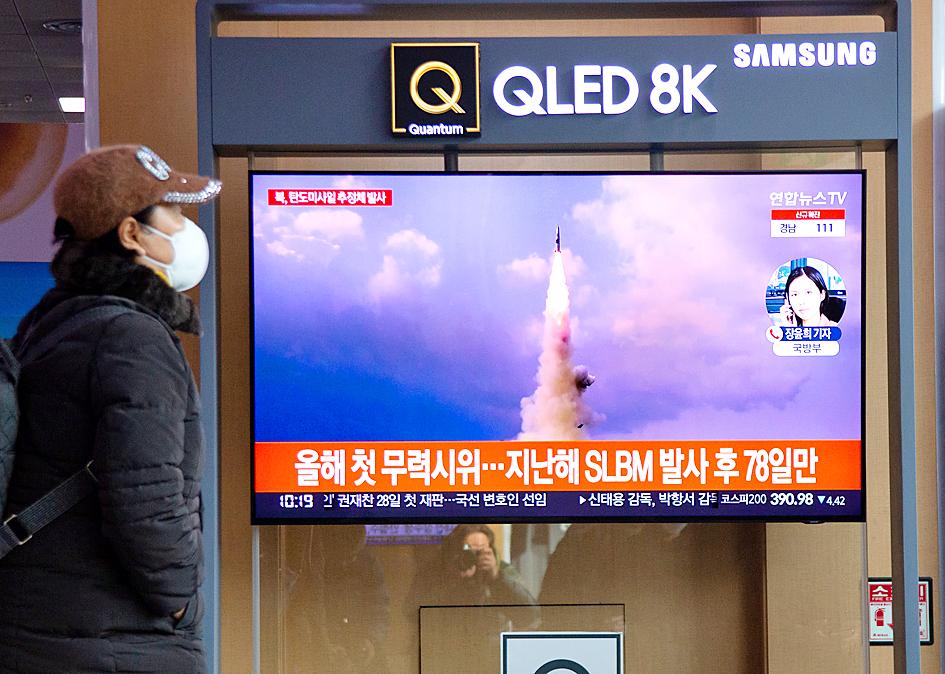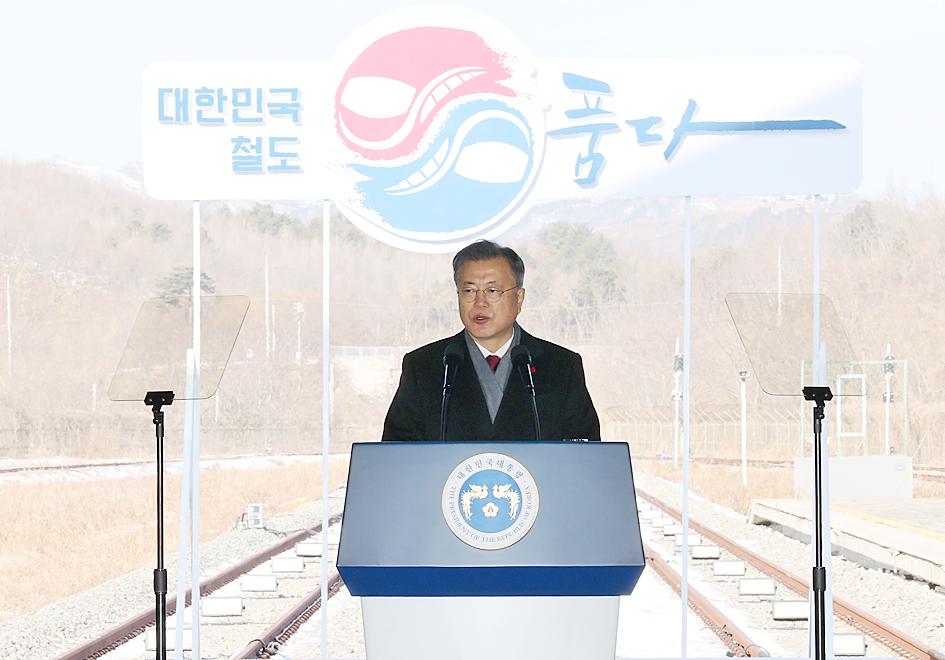Pyongyang appears to have launched its first ballistic missile in about two months after North Korean leader Kim Jong-un indicated that he was more interested in bolstering his arsenal than returning to stalled nuclear talks with the US.
North Korea yesterday fired what appeared to be a ballistic missile from land into waters off its east coast, South Korea’s military said.
The missile flew about 500km on a normal trajectory and landed in waters outside of Japan’s exclusive economic zone, officials in Tokyo said.

Photo: EPA-EFE
The flight path suggests North Korea launched a short-range ballistic missile.
Japanese Prime Minister Fumio Kishida called the launch “extremely regrettable” and said that his government would step up surveillance.
Beijing called on all parties to “act prudently” and maintain the right direction of talks and consultations, Chinese Ministry of Foreign Affairs spokesman Wang Wenbin (汪文斌) told a regular press briefing.

Photo: EPA-EFE
The US Indo-Pacific Command said it was consulting closely with allies.
“The ballistic missile launch highlights the destabilizing impact of the DPRK’s illicit weapons program,” it said in a statement, referring to North Korea by the acronym for its formal name.
The South Korean National Security Council convened and said in a statement that it was “concerned” about the launch.
The group called on North Korea to resume nuclear negotiations, which it said would help “resolve the current strain on inter-Korean relations.”
The missile was launched from Jagang Province, South Korea’s military said, near where Pyongyang in September fired for the first time what it claimed was a hypersonic glide vehicle.

INVESTIGATION: The case is the latest instance of a DPP figure being implicated in an espionage network accused of allegedly leaking information to Chinese intelligence Democratic Progressive Party (DPP) member Ho Jen-chieh (何仁傑) was detained and held incommunicado yesterday on suspicion of spying for China during his tenure as assistant to then-minister of foreign affairs Joseph Wu (吳釗燮). The Taipei District Prosecutors’ Office said Ho was implicated during its investigation into alleged spying activities by former Presidential Office consultant Wu Shang-yu (吳尚雨). Prosecutors said there is reason to believe Ho breached the National Security Act (國家安全法) by leaking classified Ministry of Foreign Affairs information to Chinese intelligence. Following interrogation, prosecutors petitioned the Taipei District Court to detain Ho, citing concerns over potential collusion or tampering of evidence. The

Seventy percent of middle and elementary schools now conduct English classes entirely in English, the Ministry of Education said, as it encourages schools nationwide to adopt this practice Minister of Education (MOE) Cheng Ying-yao (鄭英耀) is scheduled to present a report on the government’s bilingual education policy to the Legislative Yuan’s Education and Culture Committee today. The report would outline strategies aimed at expanding access to education, reducing regional disparities and improving talent cultivation. Implementation of bilingual education policies has varied across local governments, occasionally drawing public criticism. For example, some schools have required teachers of non-English subjects to pass English proficiency

‘FORM OF PROTEST’: The German Institute Taipei said it was ‘shocked’ to see Nazi symbolism used in connection with political aims as it condemned the incident Sung Chien-liang (宋建樑), who led efforts to recall Democratic Progressive Party (DPP) Legislator Lee Kun-cheng (李坤城), was released on bail of NT$80,000 yesterday amid an outcry over a Nazi armband he wore to questioning the night before. Sung arrived at the New Taipei City District Prosecutors’ Office for questioning in a recall petition forgery case on Tuesday night wearing a red armband bearing a swastika, carrying a copy of Adolf Hitler’s Mein Kampf and giving a Nazi salute. Sung left the building at 1:15am without the armband and apparently covering the book with a coat. This is a serious international scandal and Chinese

TRADE: The premier pledged safeguards on ‘Made in Taiwan’ labeling, anti-dumping measures and stricter export controls to strengthen its position in trade talks Products labeled “made in Taiwan” must be genuinely made in Taiwan, Premier Cho Jung-tai (卓榮泰) said yesterday, vowing to enforce strict safeguards against “origin laundering” and initiate anti-dumping investigations to prevent China dumping its products in Taiwan. Cho made the remarks in a discussion session with representatives from industries in Kaohsiung. In response to the US government’s recent announcement of “reciprocal” tariffs on its trading partners, President William Lai (賴清德) and Cho last week began a series of consultations with industry leaders nationwide to gather feedback and address concerns. Taiwanese and US officials held a videoconference on Friday evening to discuss the